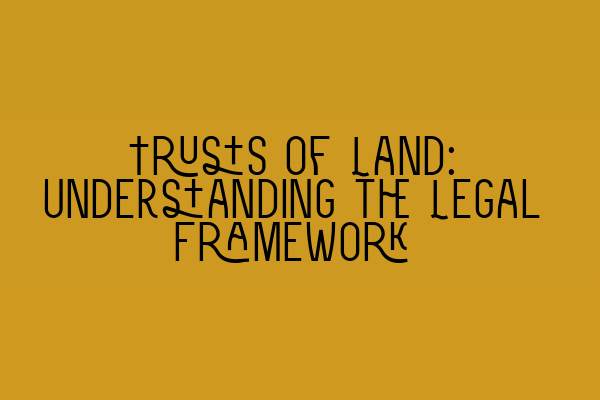Trusts of Land: Understanding the Legal Framework
Welcome to our blog post on trusts of land! In this article, we will delve into the legal framework surrounding trusts of land and explore the key concepts and principles that underpin this area of property law. Whether you are a solicitor, law student, or simply have an interest in property law, this post will provide you with a comprehensive understanding of trusts of land.
But before we get started, let’s quickly address what a trust of land is. A trust of land is a legal arrangement where the legal ownership of a property is separated from the beneficial ownership, meaning that one person holds the property on behalf of another. This allows for flexibility in property ownership and can be particularly useful in situations where there are multiple owners or when property is held for the benefit of future generations.
Now, let’s dive into the legal framework of trusts of land and explore the key concepts that revolve around this area.
1. Creation of Trusts
Trusts of land can be created in a variety of ways. The most common way is through a written declaration of trust, where the legal owner declares that they hold the property on trust for the benefit of another. However, trusts of land can also be created through implied or constructive trusts, which arise when the parties’ intentions are not expressly stated but can be inferred from their conduct or the circumstances surrounding the property.
It is essential to understand the different methods of creating trusts of land to ensure that the trust is valid and enforceable. For a detailed understanding of the creation of trusts, you can refer to this article on SQE Contract Law: Analyzing Landmark Cases and Influential Judicial Decisions.
2. Trustees’ Duties and Powers
Trustees have critical duties and responsibilities when managing trusts of land. These duties include acting in the best interests of the beneficiaries, exercising due care and skill, and ensuring that the trust property is properly maintained and protected.
Additionally, trustees have certain powers granted to them, which allow them to manage the trust property effectively. These powers can include the ability to sell or lease the property, make investments, or enter into contracts on behalf of the trust. However, it is important to note that trustees must exercise these powers in accordance with their fiduciary duties and in the best interests of the beneficiaries.
If you are interested in learning more about the duties and powers of trustees, you may find this article on Understanding Contractual Capacity: Rights and Limitations helpful.
3. Beneficiaries’ Rights and Interests
Beneficiaries of trusts of land have certain rights and interests in the trust property. These can include the right to occupy the property, receive income from the property, or ultimately benefit from the sale or transfer of the property.
It is crucial for beneficiaries to understand their rights and be aware of any limitations or restrictions imposed on them by the trust instrument or the trustees. By doing so, beneficiaries can safeguard their interests and ensure that trustees act in accordance with their obligations.
4. Disputes and Resolutions
Like any legal arrangement, disputes can arise in trusts of land. These can involve disagreements between co-owners or disputes between trustees and beneficiaries. Resolving these disputes often requires a careful analysis of the trust instrument, the parties’ intentions, and the applicable legal principles.
If you are dealing with a dispute involving trusts of land, it is advisable to seek legal advice and explore alternative dispute resolution methods such as mediation or arbitration. These methods can help parties reach a mutually acceptable resolution without the need for court intervention.
To delve deeper into the topic of disputes and resolutions in contract law, you may want to read this article on Misrepresentation in Contracts: Unveiling Deceptive Practices.
Conclusion
Trusts of land are a crucial aspect of property law, providing a versatile and flexible way to manage property ownership. By understanding the legal framework surrounding trusts of land, solicitors and law students can effectively advise clients and ensure that their interests are protected.
We hope that this blog post has provided you with a comprehensive understanding of trusts of land. If you have any further questions or would like to deepen your knowledge in this area, we invite you to join our SQE Contract Law webinars, where our experts provide insights and guidance to enhance your understanding and skills. For more information, please visit our Join Our SQE Contract Law Webinars: Expert Insights and Guidance page.
Additionally, if you are preparing for the SQE exams and would like to test your knowledge in contract law, we have interactive mock tests available on our website. These tests will help you assess your understanding and identify areas for further study. Check out our Interactive SQE Mock Tests for Contract Law: Test Your Knowledge page to get started.
Thank you for reading, and we hope this article has been informative and beneficial to you. Should you have any property law matters or if you need assistance with trusts of land, feel free to reach out to SQE Property Law & Land Law. We are here to assist you and provide expert advice tailored to your needs.
